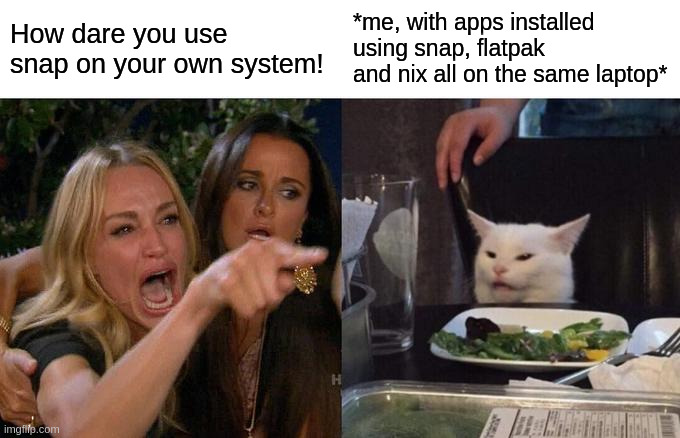this post was submitted on 20 Sep 2024
351 points (90.7% liked)
linuxmemes
22744 readers
655 users here now
Hint: :q!
Sister communities:
Community rules (click to expand)
1. Follow the site-wide rules
- Instance-wide TOS: https://legal.lemmy.world/tos/
- Lemmy code of conduct: https://join-lemmy.org/docs/code_of_conduct.html
2. Be civil
- Understand the difference between a joke and an insult.
- Do not harrass or attack users for any reason. This includes using blanket terms, like "every user of thing".
- Don't get baited into back-and-forth insults. We are not animals.
- Leave remarks of "peasantry" to the PCMR community. If you dislike an OS/service/application, attack the thing you dislike, not the individuals who use it. Some people may not have a choice.
- Bigotry will not be tolerated.
- These rules are somewhat loosened when the subject is a public figure. Still, do not attack their person or incite harrassment.
3. Post Linux-related content
- Including Unix and BSD.
- Non-Linux content is acceptable as long as it makes a reference to Linux. For example, the poorly made mockery of
sudoin Windows. - No porn. Even if you watch it on a Linux machine.
4. No recent reposts
- Everybody uses Arch btw, can't quit Vim, <loves/tolerates/hates> systemd, and wants to interject for a moment. You can stop now.
5. 🇬🇧 Language/язык/Sprache
- This is primarily an English-speaking community. 🇬🇧🇦🇺🇺🇸
- Comments written in other languages are allowed.
- The substance of a post should be comprehensible for people who only speak English.
- Titles and post bodies written in other languages will be allowed, but only as long as the above rule is observed.
Please report posts and comments that break these rules!
Important: never execute code or follow advice that you don't understand or can't verify, especially here. The word of the day is credibility. This is a meme community -- even the most helpful comments might just be shitposts that can damage your system. Be aware, be smart, don't remove France.
founded 2 years ago
MODERATORS
you are viewing a single comment's thread
view the rest of the comments
view the rest of the comments

It's a shame that snaps are forced to use Canonicals closed source backend because they are really good, and a fully snap system is a very compelling idea for immutable systems
They're not forced to do so. You can install snaps locally (or provide a distribution system that treats
snapdmuch the wayapttreatsdpkg), or you can point snapd at a different store. The snap store API is open and documented, and for a while there was even a separate snap store project. It seems to have died out because despite people's contention about Canonical's snap store, they didn't actually actually want to run their own snap stores.I don't know why you're getting downvoted. It makes perfect sense that Cannonical made it's own proprietary package ecosystem and while technically anyone can build their own snap store, ain't nobody got time for that.
Can you explain why it makes perfect sense?
It's Cannonical. They prefer implementing everything themselves fast, rather than developing a more sustainable project with the rest of the community over a longer timescale. When they do that, there will be very little buy-in from the wider community.
Others could technically implement another snap store for their own distro, but they'd have to build a lot of the backend that Cannonical didn't release. It's easier to use Flatpak or AppImage or whatever rather than hitch themselves onto Cannonicals's homegrown solution that might get abandoned down the line like Mir or Ubuntu Touch.
I don't agree that it made any sense to do that. If they wanted to containerize apps, there has been an open source solution to that for years; Flatpak.
As an app maintainer, that wants to support Ubuntu, why would I prefer to deploy a snap server, instead of publishing deb files, or creating a Flatpak?
It's Cannonical. They prefer implementing everything themselves fast, rather than developing a more sustainable project with the rest of the community over a longer timescale. It makes sense that when they do that, there will be very little buy-in from the wider community. Much like Unity and Mir.
As you say - why would others put time into the less supported system? Better alternatives exist. If Canonical want their own software ecosystem, they'll have to maintain it themselves. Which, based on Mir and Ubuntu Touch, they don't have a good track record of.
Because people who just want their daily Two Minutes' Hate rather than actually having nuanced takes.